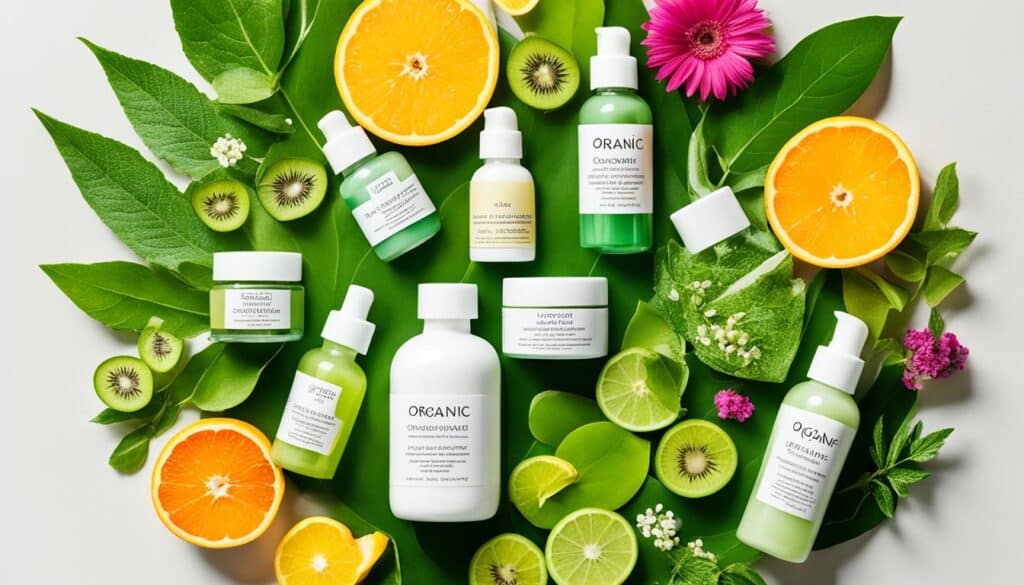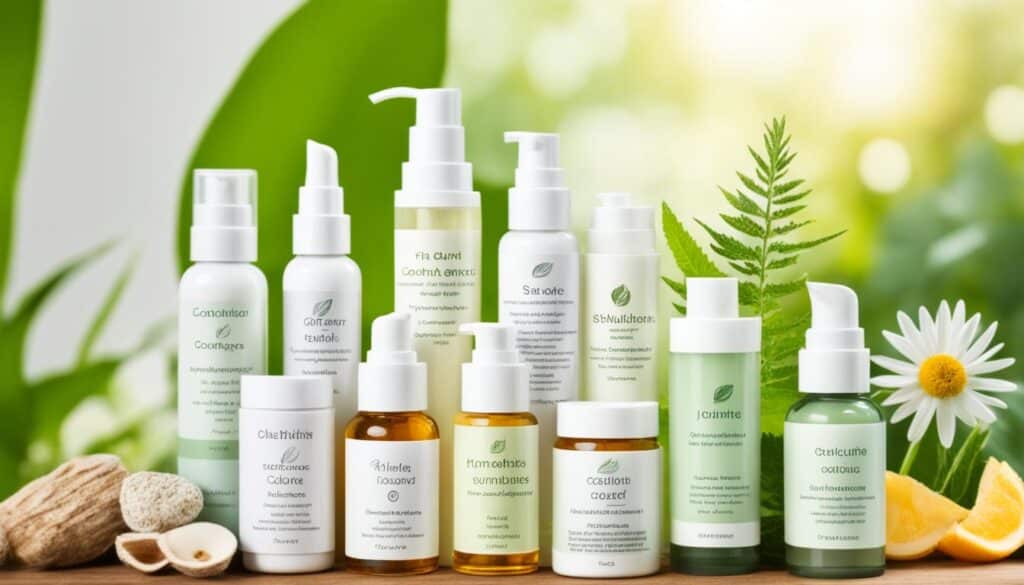Natural skincare nurtures your skin’s health with plant-based, non-toxic ingredients that nourish, hydrate, and protect for a radiant complexion. Using natural skincare can provide numerous benefits for the skin, including a rich source of vitamins, antioxidants, and bioactive compounds that can address various skin concerns. By incorporating natural ingredients into your skincare routine, you can support your skin’s overall health and achieve a more youthful, glowing appearance.
Key Takeaways
- Natural skincare products are formulated with plant-based, non-toxic ingredients to nourish and protect the skin.
- Natural skincare can provide a rich source of vitamins, antioxidants, and bioactive compounds to address various skin concerns.
- Incorporating natural ingredients into your skincare routine can support your skin’s overall health and promote a radiant, youthful complexion.
- Natural skincare products are often free from synthetic chemicals and fragrances, which can be beneficial for sensitive skin types.
- Choosing natural skincare options can align with sustainable and eco-friendly practices, contributing to a healthier environment.
What Makes a Skincare Product ‘Natural’?
The term “natural” in skincare refers to ingredients that are derived from plant, mineral, or animal sources rather than being synthetically produced. However, it’s important to note that this term is not strictly regulated, and companies can often use it rather broadly without adhering to any specific definitions or standards.
Fragrance-Free and Hypoallergenic Labels
Just because a product is labeled as “fragrance-free” or “hypoallergenic” does not necessarily mean that it is natural or safe for sensitive skin. These claims don’t guarantee the absence of synthetic ingredients or potential irritants.
Organic Certifications and Standards
For a more reliable indication of a natural and organic skincare product, consumers should look for the USDA Organic Seal. This certification requires that at least 95% of the agricultural ingredients are certified organic, providing a more stringent standard for natural and organic skincare products.
By understanding these labeling terms and certifications, consumers can make more informed choices when selecting natural skincare products that align with their preferences and skin care needs.
Benefits of Using Natural Skincare

Natural skincare products are often rich in a diverse array of vitamins, antioxidants, and bioactive compounds that can benefit the skin in various ways. These nourishing natural ingredients can help support, hydrate, and protect the skin, promoting a healthy, radiant complexion.
Rich Source of Vitamins, Antioxidants, and Bioactive Compounds
From vitamin C-packed superfruits to soothing aloe vera, natural skincare products are brimming with beneficial plant-based components that can combat free radical damage, reduce inflammation, and improve skin’s overall health. Many natural ingredients also possess inherent anti-aging properties, such as rosehip oil’s ability to improve skin elasticity and diminish the appearance of fine lines and wrinkles.
Potential Benefits for Different Skin Types
Depending on the specific skin type, natural skincare can offer targeted benefits. For those with oily skin, natural ingredients like mattifying clays can help control excess oil and shine. Individuals with dry skin may find hydrating plant-based oils and butters particularly nourishing, while those with sensitive skin conditions can experience soothing relief from natural, gentle formulations.
By incorporating a wide range of natural skincare products into your routine, you can support your skin’s overall health and address a diverse array of skin concerns, from blemishes to signs of aging.
Natural vs Organic Skincare Products

While the terms “natural” and “organic” are often used interchangeably in the skincare industry, there are distinct differences between them.
Natural skincare products are made with ingredients derived from natural sources, such as plants, minerals, or animals, but they may not necessarily be certified organic. On the other hand, organic skincare products must meet the USDA’s strict requirements, with at least 95% of the agricultural ingredients being certified organic.
USDA Organic Certification Requirements
To be labeled as “organic,” a skincare product must contain a minimum of 95% certified organic ingredients. The USDA’s National Organic Program (NOP) sets the standards for organic certification, ensuring that the ingredients are grown and processed without the use of synthetic fertilizers, pesticides, or other prohibited substances.
Organic Doesn’t Always Mean Safe
However, being organic does not always mean a product is inherently safe or better for the skin, as some natural or organic ingredients can still cause irritation or allergic reactions for individuals with sensitive skin types. It’s important to carefully read labels and patch test new natural and organic skincare products to ensure they are compatible with your skin type and skin’s health.
Are Natural Skincare Products Better for Your Skin?

While natural skincare products are often marketed as being better for the skin, this is not always the case. Even though the ingredients may be derived from natural sources, they can still cause allergic reactions or irritation in some individuals, especially those with sensitive skin.
Natural Ingredients Can Still Cause Allergic Reactions
A recent study found that over 94% of “natural” skincare products contained ingredients known to trigger contact dermatitis, a common allergic skin reaction. This highlights the importance of carefully reading labels and patch testing new products, as natural does not necessarily mean safe or suitable for every skin type.
Prevalence of Allergens in “Natural” Products
Many natural and organic skincare products can still contain potential irritants and allergens, such as fragrances, essential oils, and preservatives. This is because the term “natural” is not regulated, and companies can use it broadly without strict definitions. Consumers should be cautious and research the ingredients in any skincare product, even if it is marketed as natural or organic, to ensure it is a good fit for their skin type and needs.
Considerations for Sensitive Skin and Skin Conditions

For individuals with sensitive skin or certain skin conditions, it’s crucial to be mindful of the ingredients in natural skincare products. Fragrances, essential oils, and other potential irritants can trigger adverse reactions, leading to redness, itching, and other undesirable symptoms. When selecting natural skin care products, it’s best to choose fragrance-free, hypoallergenic options and conduct patch tests before full-body application.
Avoiding Fragrances and Potential Irritants
Fragrances, whether synthetic or derived from natural sources, can be a common culprit for skin irritation, especially for those with sensitive skin or skin conditions like eczema. It’s important to carefully read labels and opt for fragrance-free, hypoallergenic natural skincare products to minimize the risk of adverse reactions.
When to Seek Professional Help
If a rash or other concerning skin issue persists after incorporating natural skin care products into your routine, it’s recommended to seek the advice of a dermatologist or licensed skincare professional. They can help determine the underlying cause of the skin condition and provide appropriate treatment, ensuring your skin’s health and well-being are properly cared for.
Natural Skincare and Sustainability
In addition to the potential benefits for skin health, natural skincare products often align with sustainability and environmental concerns. Many natural ingredients are derived from renewable, eco-friendly sources, such as plant-based oils and botanicals. These natural and organic ingredients not only nourish and care for the healthy skin, but they also contribute to the preservation of our natural and organic skincare products.
Eco-Friendly and Renewable Sources
When consumers choose natural and organic skincare products, they are making a conscious decision to support organic skin care and organic and sustainably sourced ingredients. These natural skincare products are often formulated with botanical extracts, plant-based oils, and other natural ingredients that are renewable and have a lower environmental impact compared to their synthetic counterparts.
Environmental Impact of Synthetic Ingredients
In contrast, the artificial ingredients commonly found in conventional skin care products can have a more significant environmental impact, potentially contributing to pollution and the depletion of natural resources. These synthetic fragrances and artificial ingredients may not only irritate the skin and cause free radicals, but they can also leave a lasting negative impression on the planet. By choosing natural and organic skincare products, consumers can make more sustainable choices that support the health of both their skin and the environment.
The rise of clean beauty and the increasing demand for natural and organic skincare products reflect a growing consumer consciousness about the environmental impact of their personal care choices. As more people seek products that are inspired by nature and contain nourishing ingredients, the organic skin care industry continues to evolve, offering a wide range of natural skincare products that are not only looking and feeling great, but also all-natural and eco-friendly.
By opting for natural and organic skincare, consumers can contribute to a more sustainable future while also providing their skin with the care and nourishment it deserves. Whether it’s a night cream, facial oil, or other skin care products, the choice to go natural can have a positive impact on both personal and planetary well-being.
Common Chemicals to Avoid in Skincare

When transitioning to natural skincare, it’s crucial to be aware of the common synthetic chemicals often found in conventional products that should be avoided. These include parabens, sulfates, and phthalates, which have been linked to potential health concerns such as hormone disruption and allergic reactions.
Parabens, Sulfates, and Phthalates
Parabens are preservatives used in many personal care products to prevent the growth of bacteria and fungi. However, studies have suggested that parabens may mimic the structure and function of the hormone estrogen, potentially leading to hormonal imbalances. Sulfates, such as sodium lauryl sulfate (SLS) and sodium laureth sulfate (SLES), are foaming agents that can strip the skin of its natural oils, causing dryness and irritation. Phthalates are a group of chemicals used to increase the flexibility and durability of products, but they have been associated with reproductive and developmental issues.
Synthetic Fragrances and Potential Health Concerns
Synthetic fragrances are another concern when it comes to conventional skincare products. These fragrances can contain a complex mixture of undisclosed ingredients, many of which may be irritating to the skin, especially for individuals with sensitive skin types. Exposure to synthetic fragrances has also been linked to various health concerns, including allergic reactions, hormone disruption, and even potential carcinogenic effects. By carefully reading labels and opting for natural, fragrance-free alternatives, consumers can minimize their exposure to these potentially harmful chemicals.
Natural Skincare Ingredients and Their Benefits

Natural skincare products often contain a wide array of beneficial plant-based ingredients that can nourish, heal, and rejuvenate the skin. These include antioxidant-rich botanicals like green tea, vitamin C-packed superfruits, and soothing aloe vera, which can help combat free radical damage, reduce inflammation, and promote a healthy, radiant complexion.
Nourishing and Healing Plant-Based Ingredients
Many natural ingredients possess inherent anti-aging properties, such as rosehip oil’s ability to improve skin elasticity and diminish the appearance of fine lines and wrinkles. By incorporating these natural, nourishing ingredients into your skincare routine, you can support your skin’s overall health and address a variety of concerns.
Antioxidants and Anti-Inflammatory Properties
Natural skincare products often feature a diverse array of antioxidant-rich botanicals that can help protect the skin from environmental stressors and free radical damage. Ingredients like green tea, vitamin C, and caviar lime are known for their potent anti-inflammatory properties, which can soothe irritated skin and promote a more balanced, healthy complexion.
Creating a Natural Skincare Routine

When building a natural skincare routine, it’s important to start with gentle, plant-based cleansers and toners that can effectively remove impurities without stripping the skin of its natural oils. These gentle formulas, often infused with soothing botanicals like aloe vera or chamomile, help maintain the skin’s delicate balance and prepare it for the next steps in your routine.
Gentle Cleansers and Toners
Look for natural cleansers and toners that avoid harsh synthetic ingredients like sulfates, which can disrupt the skin’s natural pH and lead to dryness and irritation. Instead, opt for creamy, foaming, or micellar cleansers made with gentle, nourishing ingredients like plant-based oils, glycerin, or mild surfactants derived from coconut or sugar. Natural toners can also help balance the skin’s pH and provide an extra layer of hydration before applying other treatments.
Targeted Treatments and Moisturizers
After cleansing and toning, incorporate targeted natural treatments like serums or facial oils to address specific skin concerns. These concentrated formulas often contain potent, bioactive plant-based ingredients like vitamin C, retinol, or niacinamide to tackle issues like fine lines, uneven skin tone, or breakouts. Finish your routine with a moisturizer that suits your skin type, whether it’s a lightweight gel, a rich cream, or a hydrating facial oil.
Sun Protection with Mineral-Based Sunscreens
No natural skincare routine is complete without a broad-spectrum, mineral-based sunscreen to shield your skin from harmful UV rays and natural makeup. Look for sunscreens that use zinc oxide or titanium dioxide as the active ingredients, as they provide effective sun protection without the use of synthetic chemical filters that can cause irritation or sensitivity. Apply the sunscreen as the last step in your morning routine to ensure your skin is safeguarded throughout the day.
By layering these natural skincare steps, you can create a routine that nourishes and supports your skin’s overall well-being, promoting a radiant, healthy complexion.
Natural Skincare and Skin Types

When selecting natural skincare products, it’s crucial to consider your specific skin type and choose ingredients that cater to your individual needs. For example, those with oily skin may benefit from oil-controlling ingredients like mattifying clays, while individuals skin care routine with dry skin may require more hydrating plant-based oils and butters. Conducting research on various natural ingredients and their properties can help you identify the best options for your skin type.
Vegan skincare, centered on natural and organic ingredients, offers a range of natural skincare brands products tailored to every skin type. From certified organic facial oils to plant-based cleansers, these formulations support skin health without harsh chemicals or artificial fillers. Inspired by nature, they purify, hydrate, and nourish, leaving skin looking and feeling radiant.
Finding the Right Ingredients for Your Skin Type
Navigating the vast array of natural skincare options can be overwhelming, but understanding your skin type and its unique needs is the key to finding the right products. Whether you have sensitive skin, acne-prone skin, or mature skin, there are natural solutions tailored to address your specific concerns. Exploring the benefits of ingredients like aloe vera, green tea, and vitamin C can help you curate a natural skincare routine that nourishes and supports your skin’s health.
Patch Testing and Product Research
Before incorporating a new natural skincare product into your routine, it’s recommended to perform a patch test to ensure it doesn’t cause any adverse reactions. This simple step can help you avoid potential irritation or allergic responses, especially if you have sensitive skin or a history of skin sensitivities. Additionally, conducting thorough research on the brand, formulations, and customer reviews can provide valuable insights into the effectiveness and safety of natural skincare products, allowing you to make informed decisions that align with your skin’s unique needs.
Incorporating Natural Skincare into Your Routine
Transitioning to a natural skincare regimen can be a rewarding journey, allowing you to nourish your skin with plant-based, non-toxic ingredients. One of the easiest ways to incorporate natural skincare into your routine is by gradually replacing your conventional products with their natural counterparts.
Replacing Conventional Products with Natural Alternatives
Begin by swapping out your daily cleanser, toner, and moisturizer with natural, gentle formulas that cater to your specific skin type. Look for products that are free from harsh synthetic chemicals, parabens, and artificial fragrances, and instead feature nourishing plant-based oils, botanical extracts, and antioxidant-rich ingredients. This simple switch can make a significant difference in the way your skin looks and feels, promoting a healthy, radiant complexion.
Natural and organic skincare lines provide a clean beauty regimen, free from toxins and synthetic fragrances. With sustainably sourced botanicals like aloe and caviar lime, they gently purify and hydrate, catering to irritated skin or eczema. From bestselling night creams to organic facial oils, they support your skin’s health at every step.
DIY Natural Skincare Treatments
For a more personalized approach, consider exploring DIY natural skincare treatments that you can easily create at home. From hydrating face masks made with ingredients like honey and avocado to soothing body scrubs using sugar and coconut oil, these homemade concoctions allow you to target your specific skin concerns with natural, high-quality ingredients. Incorporating these DIY treatments into your routine can be a fun and empowering way to embrace the benefits of natural skincare.
By gradually transitioning to natural skincare products and exploring DIY treatments, you can nourish your skin with the goodness of nature and support its overall health and wellbeing. Remember to always patch test new products and listen to your skin’s needs to ensure a seamless and rewarding natural skincare journey.
Also Read: Easy DIY Skin Care Routines For Home Spa
Conclusion
In conclusion, natural skincare offers a harmonious approach to nurturing the skin while respecting the environment. Through harnessing the power of botanical ingredients, natural skincare products provide a gentle yet effective solution for maintaining healthy and radiant skin. By avoiding harsh chemicals and artificial additives, these products reduce the risk of irritation and adverse reactions, promoting skin wellness in the long term. Furthermore, the sustainability aspect of natural skincare aligns with the growing global consciousness towards eco-friendly practices, emphasizing the importance of preserving our planet’s resources. As consumers become increasingly discerning about the products they use, the demand for natural skincare continues to rise, driving innovation and encouraging transparency within the industry. Embracing natural skincare not only benefits personal health but also contributes to a more sustainable and ethical beauty routine, promoting a holistic approach to self-care and environmental responsibility.
FAQs
Q: What is natural skincare?
A: Natural skincare refers to products made with natural and organic ingredients, free from harsh chemicals, synthetic fragrances, and other toxins.
Q: Why should I choose natural skincare products?
A: Natural skincare products are gentle on the skin, can improve skin health, are better for the environment, and are often cruelty-free and vegan.
Q: How can natural skincare improve my skin health?
A: Natural skincare products can help to nourish and hydrate your skin, reduce inflammation, protect against environmental damage, and promote a healthy skin barrier.
Q: What are some common ingredients in natural skincare products?
A: Some common ingredients in natural skincare products include botanical extracts, essential oils, shea butter, aloe vera, and natural antioxidants like vitamin C.
Q: Is natural skincare suitable for all skin types?
A: Yes, natural skincare products are generally suitable for all skin types, but it’s important to choose products based on your skin type and concerns.
Q: How do I build a natural skincare routine?
A: A basic natural skincare routine involves cleansing, toning, moisturizing, and applying sunscreen during the day. You can customize the routine based on your skin’s needs.
Q: Are natural skincare products effective in treating specific skin concerns?
A: Yes, natural skincare products can be effective in treating various skin concerns such as acne, dryness, sensitivity, and aging, depending on the ingredients used.





